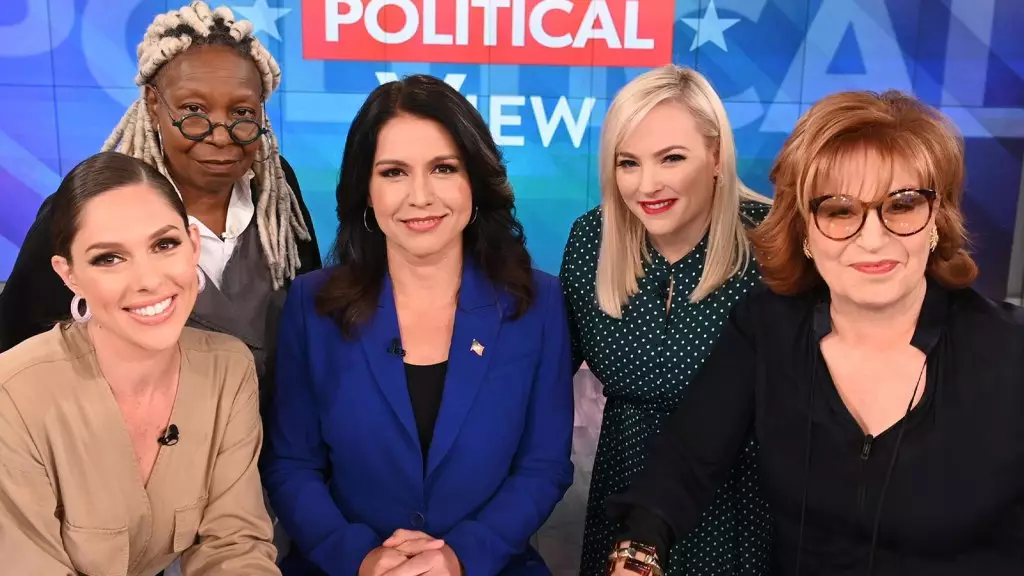Throughout the tumultuous landscape of television talk shows, few personalities have stirred as much conversation as Meghan McCain. Her tenure on ABC’s *The View* was marked by fierce debates, passionate opinions, and ultimately, a controversial exit. More recently, McCain has forged a friendship with political figure Tulsi Gabbard, which has sparked reflections on past experiences, including the dynamics she faced with her former colleagues on *The View*. This article delves into the nuances of McCain’s departure, her evolving relationships, and the implications of her recent public statements.
On a vivid occasion at the Stand with Women event in Philadelphia, McCain and Gabbard reminisced about their past interactions. Recalling their shared experience on *The View*, McCain articulated a sense of protectiveness toward Gabbard, whom she recognized was often subjected to harsh scrutiny from the panel. This recollection indicates a significant aspect of McCain’s character; loyalty to her friends, especially in the face of adversity, seems to shape her public persona. This loyalty is not limited to Gabbard alone but extends to acknowledging the challenges faced by women who step into the male-dominated arena of politics and media. McCain’s remarks about her protective instincts suggest she values camaraderie deeply in a landscape often characterized by competition and animosity.
McCain’s comments during the event hinted at an underlying tension that has persisted since her departure from *The View*. By stating that her former co-hosts were “so scared” of Gabbard, she subtly criticized the atmosphere of the show. Her analogy of the panel members as “vultures” highlights a negative environment that she perceived during heated discussions. Such remarks reflect on the workplace culture that can evolve in high-stakes settings such as a talk show and suggest that McCain’s experiences were colored by conflict and emotional strain. Her extensive critique of her former colleagues, referring to them as “crazy old people” and labeling the show as “rigged,” sheds light on her feelings of alienation and dissatisfaction while she was part of the panel.
Legal Threats and Social Media Feuds
Since exiting *The View*, McCain has been vocal about her experiences, making headlines not only for her opinions but also for her reactions to the comments made by her former colleagues. Her threats of legal action against Ana Navarro, in particular, underscore a fractious relationship still simmering beneath the surface. The cycle of public debates, insinuations made during shows by her former co-hosts, and McCain’s subsequent social media responses illustrate a messy and unresolved tension that seems to haunt her even after leaving the show. Her statement that “these women will never quit me” could be interpreted as both a declaration of strength and a lament for the unresolved conflicts that linger in her history.
While speculation swirls around her relationship with the current roster of *The View*, McCain stated unequivocally that there is “not a chance in hell” she would return to the program. This definitive stance reflects a desire to move on and perhaps indicates a need to carve out a new identity away from the identity she formed while on the show. Her claim that she does maintain friendships with some behind-the-scenes staff members suggests that while her public persona may be at odds with her past co-hosts, she still values personal relationships in a professional context.
Meghan McCain’s journey from *The View* to her current endeavors illustrates a complicated relationship with her past and those she formerly worked alongside. The friendships she cultivates now, like with Tulsi Gabbard, present a stark contrast to what was once a contentious environment. McCain’s ongoing reflections and criticisms not only offer insight into her character but also highlight the broader challenges that women face in media and politics. The events of her past continue to shape her present and future, reminding us of the lasting impact that workplace dynamics can have on personal identity and professional trajectories.


Leave a Reply